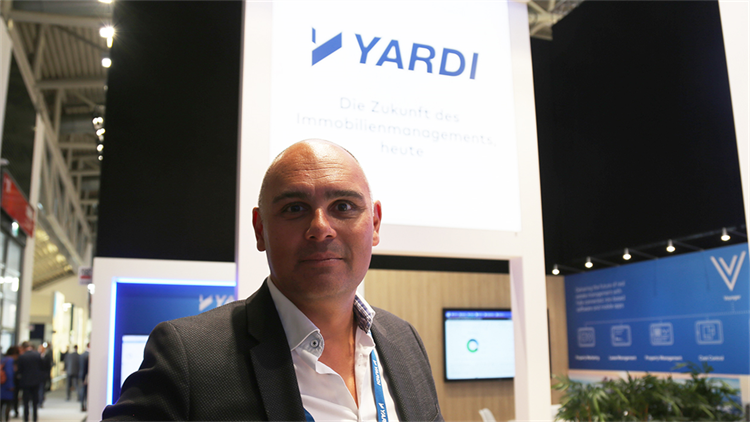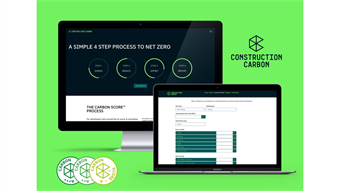“The data is now the most crucial part of the real estate business”
- In Analysis
- 13:05, 07 juni 2019
- 2737 Views

But it isn't enough to just possess data, as explains Richard Gerritsen, European director of California-based software company Yardi Systems
As digitalisation becomes increasingly embedded in the real estate industry, how to handle and collect the huge amount of available data is becoming a key competitive advantage, says Richard Gerritsen, European director of California-based software company Yardi Systems. The quality is essential. “Without good quality data, the value of any proptech solution is limited.”
The real estate industry currently faces a watershed moment, according to Richard Gerritsen, European director of California-based software company Yardi Systems. “We are in the middle of an explosion of the volume of available data. Tenant apps and all other proptech solutions are worth nothing without the data. The upside is that it is easy to get the data, but at the same time collecting it is also the most difficult – and boring - part.”
As the real estate industry becomes increasingly digitalised, the quality of data will become ever more important, says Gerritsen. “You could argue that data is the most crucial part of the business. We are living in the data era and it is such a big part of the real estate industry. Any proptech solution tries to add value based on the data already available. Without good-quality data, the value of a proptech solution is limited in a best-case scenario. If you can’t guarantee that the data is good, you can lay dozens of apps over it, but it won’t be a sustainable solution. Those who say it is too much of an effort to bring it together will not succeed.”
Gerritsen provides the following example to illustrate the importance of getting the details right. “If I log into a tenant app and discover that the lease information is not correct, that I have logged into unit 24 instead of 23, or that the app doesn’t know me at all, that is really bad. In the past 20 years, those types of errors were commonplace, but nobody really knew it. Now if you want to open up and interact with tenants and there are errors in leasing contracts, that’s no longer acceptable. That’s the new reality.”
New business models
In the future, landlords, investors and property managers will need to track more data rather than less, Gerritsen predicts. “Collecting data is becoming the new norm for landlords. In this day and age of search machines like Google, data is generally available. My local knowledge is not exclusive, the data is all there. The challenge is to maximise the use of that data and improve it. To get to that point, landlords need to know much more about their tenants, what the required data sets are, for example to track footfall in a shopping centre. How do visitors walk, how much do they spend, where do they buy etc. It doesn’t make the cut if all I know is the name and address of a popular store or restaurant.”
Gerritsen points out that it is quite inexpensive to have sensors to track footfall, for example. “But it is not only about the amount of money you need to spend to obtain data. You need to offset the costs against the perceived benefit. If you are collecting data and all you do is send an invoice for the data every month, that is a pretty expensive model. But if you can create new business models from that data to monetise the property, then the question is: is the undertaking still expensive? You could argue that it’s expensive not to do it.”
Shopping centres, for example, are a better provider of customer experience than any website, but they need to be more data rich, Gerritsen says. “They need to maximise the monetisation of their units while their operators have a need to be part of the whole community and know what’s going on in other parts of the retail area. A restaurant chain like Vapiano no longer just wants to rent a unit to sell pizza and pasta. It is becoming a requirement for the tenant as well as the operator to learn how individual businesses are evolving as part of the whole.”
Operators are key in the real estate ecosystem
The office asset class is likewise evolving and Gerritsen sees many landlords becoming more like an operator as they are in the retail sector. Office landlords are also seeing that their end users are developing completely different requirements from in the past, he adds. “In the past, occupiers just wanted a fixed desk, now they want a gym, healthy lunch options, a location for drinks with a DJ... There are two sides to this coin. New services give landlords an opportunity to increase their revenues, but they can only do that if they know what the staff want, what makes them stay and what makes them happy. They need to know these things and have data to back up their theories.”
He points to flexible office space providers like WeWork. “Operators are becoming a very important part of the real estate ecosystem. An operator like WeWork has a massive amount of data from what they collect in their offices and on the basis of that they create new services. Because they are data rich, they are able to focus on the end-user level. It puts them in a better position to provide better services.”
The residential sector also offers huge potential to create new services due to the sheer volume of this segment, Gerritsen continues. “A lot more technology will be adopted in this asset class,” he predicts. In the residential sector, new data is becoming available from developments in the Internet of Things (IoT) and smart meters that measure energy consumption, for example. “We have been doing that for more than a decade in the US for millions of American residents.”
Energy consumption is a big focus for Yardi going forward, he continues. “If you are able to measure it, you are able to generate a wealth of data and forecast future consumption. You can also use this data to come up with measures to minimise consumption.” These were logical next steps for Yardi to take and have resulted in very broad energy management solutions, he adds. “These tools have become very successful in the US these past three to five years and we will be introducing them in Europe in 2019.”
Gerritsen also see significant potential for collecting more data in the logistics space. “If you have a big box that is strategically located you might think that your work is done. But an operator needs to work with his clients, precisely because it is a big box. The challenge is how do you differentiate your asset from other big boxes and ensure that there is an optimal customer experience.”
The importance of a long-term vision
Despite the opportunities, the reality is that many landlords, investors and property managers are still struggling to come to grips with the far-reaching implications of the data era, claims Gerritsen. “What I find interesting is that a recent KPMG survey of European CFOs concluded that the majority – or 92% - see technology as a driver of fundamental change in the real estate industry. But only 32% of those surveyed said they actually have a strategy. That is an amazing outcome in an industry where so much money flows at all levels.”
The implications are quite far-reaching for a company management’s view on the world and their strategy, Gerritsen continues. “What you often see if there is a lack of strategy or vision, is a short-term interest or focus on spicing things up quickly, for example, with the purchase of a cool new app, or something in the periphery of what the company is doing. A company could argue that it’s modern and getting ready for the new data age because it has an app. But that doesn’t make it a frontrunner. That is the type of discussion I often have with clients.”
Winners and losers
Gerritsen sees this trend virtually on a daily basis. “When it comes to technology, the winners are not the traditional companies with a cool app. The winners are those that adapt their business models to an area with a new reality, an area where data is generally available. That is a big step for companies that traditionally drew their data from local experts who they paid for their knowledge and service.”
Yardi helps its clients negotiate the challenges of integrating new technologies into their business processes by helping them to create reliable data. “That’s the first step. Then the client can decide whether they want to use Yardi’s tenant app or that of a competitor. We do not force clients to only use our solutions, we offer flexibility. Our clients may want to work with other systems for a number of different reasons, but we have always maintained that we need to have all tools available in a single fully-connected platform.”
The development and growth of Yardi’s services is based on the principle that clients want to have - or should want to have – all data, functionality and documents in one place in the cloud, Gerritsen notes. “In our view that should be standard for all players in the real estate business. But that is only the starting point. The question is: how can you adapt an organisation to create something new, based on the principle that you have all the data.”
While Yardi is something of an old-timer in the proptech space, Gerritsen does see a number of start-ups that he believes have an interesting model. “One example is 21st Real Estate, a German company focused on modelling and financing and putting transactions and other data all in one place. I like the concept. It is in line with how we at Yardi see the world, creating a one-stop shop. From a transaction point of view, it all comes down to the data. The key question though is: how do they get the data? It can be tremendously hard to get the right data.”
[About the author: Judi Seebus is the former Editor in Chief of PropertyEU who conducted this interview with Yardi before recently becoming a Director at Bellier Financial in Amsterdam]






